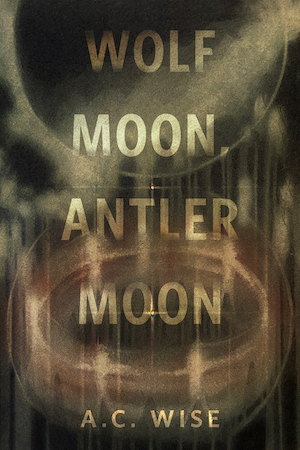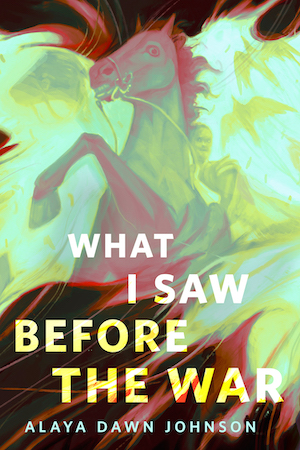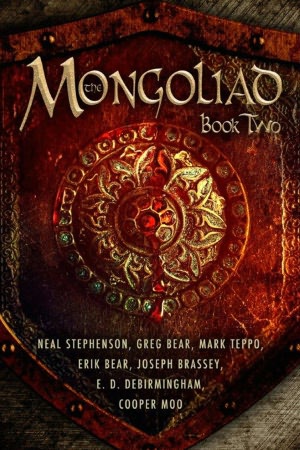We’ve got a real treat for you — an exclusive excerpt of The Mongoliad: Book Two (out today), complete with two fantastic illustrations that can only be found in the collectors editions of Books One and Two, out on October 30 from 47 North!
In the aftermath of the Mongolian invasion of 1241, beleaguered Christians struggle with the presence of a violent horde and a world turned upside down. Apocalyptic fever sweeps through Europe, infecting even the most rational individuals, leaving all to wonder if they are seeing the end times — or an hour when new heroes will emerge from the ruins of cataclysmic defeat.
An order of warrior monks, the Shield-Brethren, refuses to yield, plotting to overthrow the invaders despite insurmountable odds. Father Rodrigo Bendrito receives a prophecy from God and believes it’s his mission to deliver the message to Rome. Along with the hunter Ferenc, orphan Ocyrhoe, healer Raphael, and alchemist Yasper, Rodrigo sets out to reclaim Europe. But to save Christendom, someone must slay the fierce Khan of Khans.
Brimming with intrigue and colorful characters, The Mongoliad: Book Two is a riveting, expertly rendered tale about the will to survive.
Read about how the tale was constructed here or dive straight into The Mongoliad: Book Two below.
CHAPTER 2: Boy Meets Gruel
Every day in the cage was another day of freedom.
Haakon’s prison was a rough enclosure of wood and bone and metal, too small to allow him to stand upright, and if he lay down and stretched his arms over his head, he could just touch the metal bars with both his fingers and his toes. The roof was made from long planks, mismatched and warped. The cage sat in the back of a weather-beaten cart. A pair of stolid oxen pulled the cart—one brown, one black—at a pace always too slow for the liking of their handler. At first, Haakon was inclined to agree—the scenery passed with agonizing slowness—but in time, he realized every day they traveled was another day he would not have to face whatever fate the Virgin had in store for him. Another day of life. Another day of freedom.
The caravan was heading east. It had left Legnica the morning after his bout in the arena against the “demon” Zug. Haakon had walked into the tunnel of the Red Veil, expecting—naively, he now realized—some manner of reward ceremony, perhaps even an audience with Onghwe Khan himself. Instead, he had been accosted by a dozen Mongol warriors wielding pole-arms with weighted ends. He had instinctively blocked the first guard’s jab, and had soon realized that defending himself was only going to increase how much they would hurt him when they finally knocked away his sword (and he did not suffer the illusion that he could best twelve men with pole-arms).
They had driven him into a tent beyond the arena, and once inside the tent, they had forced him to strip out of his armor. As long as he complied with their gestures, they only prodded him with the weighted staves; they did not want to hurt him, and Haakon—biding his time—did not relish the idea of trying to escape with a broken arm or leg. Once he had removed his armor, his arms and legs were bound. A crude leather sack was forced over his head. Only then had he panicked.
Some creature had perished in the bag; he could smell—and taste—the taint of its blood. He tried to shake the bag off his head, but as he thrashed about, he only managed to force the rough hide more firmly against his mouth and nose. He could hear their laughter, and as he struggled against a black tide that threatened to overwhelm him, their laughter became the last thing he remembered.
When he came to his senses, he was in a cage, buffeted by the cart as it bounced over muddy ruts of a wide track through the Polish forest. Since then, the only thing that had changed was the landscape. The trees, shorter and fewer in number, gave way to rocky terrain and then gently rolling plains covered with silky, tall grass.
The caravan was long, though much of his immediate view was blocked by similar cages on the carts in front and behind him—other prizes from Christendom.
The man in the cart just behind Haakon’s was huge. His red hair and beard overflowed his tiny head, and his body—wedged against the cage’s bars and in the cramped corners—was covered with a layer of fine red hair. A wrestler, Haakon thought. He fervently hoped their destination was not another gladiator-style arena. He did not wish to fight this man.
The captive in the next cart forward lay on his back and did not move overmuch; Haakon suspected he would not survive their journey.
And so Haakon waited. In time, his body grew accustomed to the shifting motion of the wooden cart; he listened to the Mongols as they shouted at the oxen, slowly absorbing the sounds of their language; he could tell when the cooks shifted from green wood to dried dung for their fires; when it rained, he would roll against the bars of his cage and let the bitter water sluice down his grimy face and into his mouth. He slept as often as the rattling motion of the cart allowed. At night, he studied the sky, trying to find the shapes he knew: the eyes of Thiassi, thrown into the heavens by Odin after the All-Father plucked them from the jötunn’s head; the deer (Duneyrr, Duraþrór, Dvalinn, and Dáinn) who cavorted in the branches of the World Tree; and the trio of bright stars that represented the distaff of Frigg. Below the horizon, he watched the passage of the caravan guards, memorizing the schedule of their shifts. Even if an opportunity presented itself to escape, he was not inclined to take it. Where would he run?
His captors were taking him someplace, for some reason. He’d know soon enough. Perhaps too soon.
The rhythmic creaking and jolting of cage and cart, the guttural curses of the handler and his assistant, the infrequent lowing of the oxen, the mournful sighs and whispers of wind over the endless grass, filled Haakon’s mind and brought him a strange, contemplative peace. He had many, many hours to remember his training…and to prepare for whatever ordeal awaited him.
Your enemy will arrive when he is ready. At Týrshammar, Feronantus had been their oplo, and the elder veteran’s style had been much different than Taran’s training at the Legnica chapter house. Haakon had struggled with winning the first crossing of the swords, and while he knew his greatest weakness was committing too heavily to his initial strike, he had not been able to come up with a better tactic. Learn to wait, the old master of Týrshammar had told him. Even though it may seem impossible, when your blood is hammering in your ears and your hands are eager to bury the sword point in your enemy’s skull, hold back. Watch. Wait!
For the following month, Feronantus designated Haakon as the defender in every practice. He could never initiate an attack; he could only respond. At first, Haakon had chafed at this role, thinking he was being punished, but gradually, he came to realize the defender was actually the one who controlled the exchange.
***
A week or two into their journey, the caravan paused at an enormous camp that stretched as far as Haakon could see. His field of vision was limited by other carts and cages, now circled and bunched, but through them, in every direction, he saw nothing but the rounded peaks of Mongolian tents—ger was the word they used—and a fluttering profusion of standards and tiny flags.
Haakon’s legs failed him as he realized this was the true Mongolian Horde that threatened Christendom. The force sprawling across the plain near Legnica had been a gnat compared to this gigantic assembly, and he shivered uncontrollably as he tried to imagine how many men the Mongol generals had at their disposal.
On his knees, he pressed his head against the rough floor of his cage, seeking sanctuary in a childhood prayer to the old gods of his forefathers.
Eventually, someone rapped against the bars of his cage with a baton. A thin man with a wispy strand of hair hanging stiffly from his chin stood beside the cage and jabbered in the Mongol tongue, smacking his baton repeatedly against the bars. Haakon looked up from his prayers and blearily focused on what the man was directing his attention to: a wooden bowl and, beside that, a strip of dried meat. The Mongol rapped the bars once more, indicating that he should eat.
Haakon scrambled over to the food, ignoring the Mongol’s cackling laugh. He was familiar with the meat; once a day, a piece much like it was thrown into his cage. It was salt or sweat cured and had the texture of untreated leather. Eating was a time-consuming process of flexing and softening the meat with his hands before forcibly ripping it up and putting small pieces in his mouth; then he worked the dried meat more with his teeth and what saliva he could muster. To eat it too quickly was to be stricken with stomach cramps later. The first time, the cramps had lasted a full day and he had not been able to move his bowels for another two days afterward.
Occasionally, he could catch a guard’s attention, and through pantomime at first—but more recently, using some of the Mongol words he had learned—he would ask for water. Once in a while, they would bring him a small amount in a crude cup, barely enough to lessen the drudgery of eating the meat.
The bowl, to his surprise, contained a watery rice gruel. Still a little warm, even. It was, Haakon decided, a reward from the Virgin for his patience. He meant to savor it, but his fingers scooped it quickly into his mouth.
For the next hour, until the man returned for the bowl, he sucked at its rim, making sure he got every last drop.
The following morning, the thin man arrived again with both meat and gruel. Haakon ignored the bowl at first, beginning the laborious project of softening the meat instead, and his stomach cramped. His body yearned for the watery rice paste, but the change in routine had made him wary. Why were they feeding him better? Had he reached the end of his journey?
There was more activity along the line of carts this morning, and he pressed himself against the bars to get a better view. Several groups of men were slowly moving down the line, assessing the cargo. They were dressed in much finer clothes, colorful silk jackets instead of the heavy and plain garments he was used to seeing.
Leading them was the largest man Haakon had ever seen.
Though tall and broad shouldered, the man’s greatest bulk lay in an enormous midsection, wider than a karvi, or a snekkja, even, longboats that could carry up to two dozen warriors. Haakon reckoned it would require the strength of two, maybe three men to lift this giant off the ground—and more to push him over.
Unlike the others, the giant wore armor of overlapping leather plates—the entire skin of at least one adult ox, Haakon reckoned. Around his neck and over the armor, he wore many necklaces—gold and silver—and a huge gold medallion glittered at the shallow hollow of his throat.
The gold had been worked into the snarling visage of a wolf.
One of the caravan guards, in awe of the giant and his retinue, nervously gibbered as the group paused near Haakon’s cage. Haakon listened to the guard’s stammering speech, catching a few words. The large stranger stared at Haakon all the while, grunting occasionally in response to the guard’s story, and Haakon realized the guard was telling the giant about the fight in the arena. With a wild cry, the guard launched into a clumsy impression of Haakon’s final assault on Zug with the demon’s pole-arm. The giant—who, Haakon guessed, was one of the Mongol generals, perhaps even one of the other Khans, a relative of the dissolute Khan who lorded over Hünern—glanced briefly at the guard as the nervous man finished his exhibition, before returning his piercing gaze to Haakon.
Haakon shrugged. “I fight,” he said, hoping that he had learned the word correctly from the caravan drivers and that he was not claiming to be a farm animal.
The giant laughed, and Haakon reasoned it made no difference if he had gotten the Mongol word right or not. His life was entirely in this Mongolian’s hands, and as long as the man appeared amused by his words, then whatever he had said was the best response. Haakon realized the general’s visit was probably the reason he had been given the gruel—if the prizes were to be inspected, it followed they should be somewhat healthy. He picked up the bowl of uneaten gruel and raised it in a gesture of thanks.
The general grunted in response and took several ponderous steps closer to the cart. His round face was oddly childlike, but his eyes were too quick and focused to be mistaken for a youngling’s innocent gaze. His retinue darted around behind him, like a pack of scavengers waiting for the larger predator to finish with its kill.
Not knowing what else to do, Haakon sat down and started to eat the gruel. The general watched, studying Haakon not as a curiosity but as a warrior would carefully watch the simple movements of his enemy in order to learn something of how he might carry himself in combat.
When the bowl was empty, the general pointed at himself with the forefinger of his right hand. “Soo-boo-tie,” he said. He said it again and then pointed to Haakon.
“Hawe-koon,” Haakon replied, touching his chest.
The Mongolian general nodded and tried Haakon’s name several times, sounding as if he were trying to speak around a stone in his mouth. Haakon decided to not undertake the same effort, fearing the general’s humor might dissolve should Haakon display a commensurate clumsiness with the Mongolian name. Instead, he saluted with the bowl again, and as it was empty, he offered it to the general.
He had wanted to show some deference to his captor, the sort of noble gesture that Feronantus would have expected of him. Even though he was a prisoner, he was still a member of the Ordo Militum Vindicis Intactae. The bowl was the only thing he had to offer. His fealty was not available.
Soo-boo-tie stared at the crude bowl for a moment and then plucked it from Haakon’s grasp. He spoke a few words to his retinue, and they scattered, rushing to continue their inspection of the caravan’s prizes. Soo-boo-tie lingered for a moment and then laughed once more as he turned to depart, waving the bowl at Haakon.
The caravan guard stared at Haakon, open mouthed, and when Haakon met his gaze and shrugged, the guard spooked—jerked back, dropped his jaw, and raised his hands in deference. Then he recovered, straightened, snapped his mouth shut, and ran bandy-legged after the general and the others, leaving Haakon to wonder what had just transpired.
The next morning, the caravan moved on, and no more gruel was offered. The caravan masters returned to throwing a single strip of dried meat into his cage, once a day. But the pieces were bigger and not quite as hard.
***
Haakon dreamed about the bowl. In the dream, he had not given it back, and the general had let him keep it. During the day, he hid it beneath his ragged shirt, tucking it against his side and holding it in place with his arm. On the nights when it rained, he pushed it out of his cage to catch the rainwater.
The shallow bowl of his dream was turned from a piece of knotty wood, and he could feel the tiny divots in its center where the woodworker had finished his work with a chisel. Was its maker still alive, or had he been killed when the Mongols had conquered whatever city he lived in? Haakon and the bowl had that much in common: they were spoils of war.
During the endless caravan ride, he had seen, firsthand, the aftermath of Mongol victories. From the older Shield-Brethren who had gone to the Levant to take part in the Crusades, he had heard stories about the atrocities perpetrated by the conquering armies (with the exception of the legendary Salah-ad-Deen, whose name Haakon could barely pronounce, though Raphael had spoken it several times). The reality, however, was much starker than his imagination.
Everything and everyone in these dying lands seemed to have become a prize to be split up, argued over, and ultimately taken away, killed, or enslaved. A Mongol commander’s worth became measured in how much treasure he controlled, and Haakon could imagine how the constant lure of fresh conquests would be irresistible to those hungry to prove themselves to their generals. One bowl was not much in and of itself, but when wagons laden with such prizes returned to the Khagan, the wealth became substantial. One man made little difference, but cart after cart of prisoners made the victory all the greater.
In Haakon’s dream, he imagined using the long-lost bowl to escape, beating a guard who came too close to his cage, smashing it over the Mongol’s head until bone broke. The bowl itself was too knotty to break, a twisted piece of an ancient tree that was older than any living Mongol today.
Haakon dreamed even while awake. Once free of the cage, he would find a blade. How many could he kill with blade and bowl before the Mongol archers filled him with arrows? Could he steal a horse and ride away?
How far from Legnica was he?
Free of his cage, surrounded by dead Mongols, he found himself in possession of a map, a yellowed piece of parchment like the old map of the known world the Shield-Brethren kept in the great hall at Týrshammar. The eastern edge of the map was the great winding length of a Ruthenian river. The Volga? That name sounded right, but he wasn’t sure. He had only seen the map once after word of Onghwe’s challenge had come to Týrshammar’s cold rock. Feronantus had used it to show the Shield-Brethren where they were going, but had only gestured at the eastern edge of the map to show where the invaders were coming from. None of them had imagined they would ever actually go there.
Still free of his cage, the bloody bowl clutched in one hand, he found himself riding one of the squat Mongol ponies, his body rocking back and forth as the pony galloped free. Did it know where it was going? In Haakon’s other hand the parchment map streamed out like a banner; he tried to look at it as the pony fled through the sea of grass. The moon was a pale sliver in the dark sky, and the markings on the map were faint lines in the ghost light. Here was a river, there a mountain range, and then—the rest of the parchment rippled out like an endless ribbon of moon-white blankness.
Still, Haakon kept riding, hoping the pony was going in the right direction, toward the river and the mountains.
Otherwise, he was going to tumble over the edge of the map, into the endless, frozen depths of Hel’s terrible domain…
***
A voice.
Haakon opened his eyes and stared at the cage’s slatted ceiling for a few moments, then shivered to toss off the fleeting, terrible fragments of his dream. Hel herself had gripped him with hideous claws of icicles and bone. Her tangled gray-white hair had been crusted with the frozen brine of mourners’ tears…
He lurched and cried out in abject misery. Such a fool he had been, riding that stupid pony over the edge of the known world! Why hadn’t he checked the stars? If he had put the Dvalinn, the sleeping deer, on his right, then he would have been heading west.
He looked away from the cage ceiling, trying blearily to recall the open night sky.
“Wake up, fool,” the voice said again. Something banged against the bars, and Haakon turned his head. One of the Mongolian short-legged ponies trotted alongside the slowly rolling cart. Its rider was leaning over and banging a bowl against the bars to get Haakon’s attention. White liquid slopped out, and Haakon scrambled up to the bars, his throat constricting in panic at the sight. The rider grinned and let his horse drift away from the cage so that Haakon had to squeeze himself against the bars and strain to reach the bowl.
The horseman finally relented, with a grunt. Haakon grabbed the bowl and tugged it into the cage, where he held it in wonder for a few seconds. The bowl contained thickened rice paste, a strip of meat, and a residue of sweet rice water. Using the piece of meat as a utensil, Haakon scooped the paste into his mouth. His belly, shrunken to almost nothing, filled quickly, so he chewed the piece of meat slowly, taking his time with it, and made sure to suck down every drop of rice water—and then to lick the bowl clean.
Gruel and meat. And the rider did not come back to take away the bowl. Something had changed. The caravan was going to halt soon.
The terrain had changed again. A few days ago, they had passed within sight of a small village nestled in the crook of a long and glittering track of river, and since then, isolated patches of pasture had started to break up the endless expanse of steppe grass.
During his long journey, Haakon had come to understand just how nomadic the Mongolian people were, and the familiar signs of civilization struck him as oddities on the steppes.
At first, they had passed through regions conquered by the Mongol Horde, savaged lands that had been stripped of any value by the voracious appetite of the raiders. And then came the desolate places, lands too sere or remote for any people to find hospitable.
His belly full, Haakon wedged his shoulder against the bars of his cage to brace against the motion of the cart, steadying his eyes to watch these strange scenes pass by. They had certainly gone off the edge of any map he knew, of any map anyone he had ever met might have known—with the exception of the Binder girl, perhaps.
He stared at the wandering clumps of herd animals—sheep, goats, camels, the occasional yipping dogs and shaggy cows—and the tiny clusters of ger that sprouted from the grasslands like gray mushrooms. He was the first of his brothers to come to this place, and for the first time in many days, he found himself looking forward to what lay beyond the horizon.
Does Zug’s home lie out there? he wondered.
When the rider returned for the bowl, Haakon asked him if this place had a name. The Mongol answered brusquely, and Haakon repeated the single word to himself for the rest of that day, trying to dispel the unease it left in his belly.
It sounded like the noise ravens made. Kara-kora-hoom. He couldn’t stop thinking about the black birds he had seen on the ruined walls of Legnica. Ominous harbingers.
The Shield-Brethren swore their oaths to the Virgin Defender, a warrior maiden whose face they would never truly see until they died. She was Skuld, and yet she was not. Some of the other boys from his tribe clung tenaciously to the stories they had absorbed from their mothers’ breasts, but Haakon had looked on the vastly different faces of the students at Týrshammar and understood each knew the Virgin in his own way. When the priest in the Christian temple spoke of “Mary,” he was talking about the same goddess.
Even back then, before Haakon had learned how to hold a sword and how to carry a shield, he suspected the world was larger and more mysterious than he could ever truly imagine.
Hearing the raven-squawk name of the place where he was being taken, he found comfort in the idea that the world, in all its cruel vastness, was but a grain of sand in the Virgin’s palm. It did not matter where he died. As long as he died in the Virgin’s service, he would finally see her glorious face.
After his inevitable and bloody warrior’s death, the icy fingers of Hel would twitch empty, and the queen of the dead would scream in disappointment.
The Virgin herself would be waiting for Haakon. She would garland his neck with a wreath of cornflowers and clasp him to her spring-sweet bosom.
This he knew, and it gave him strength.
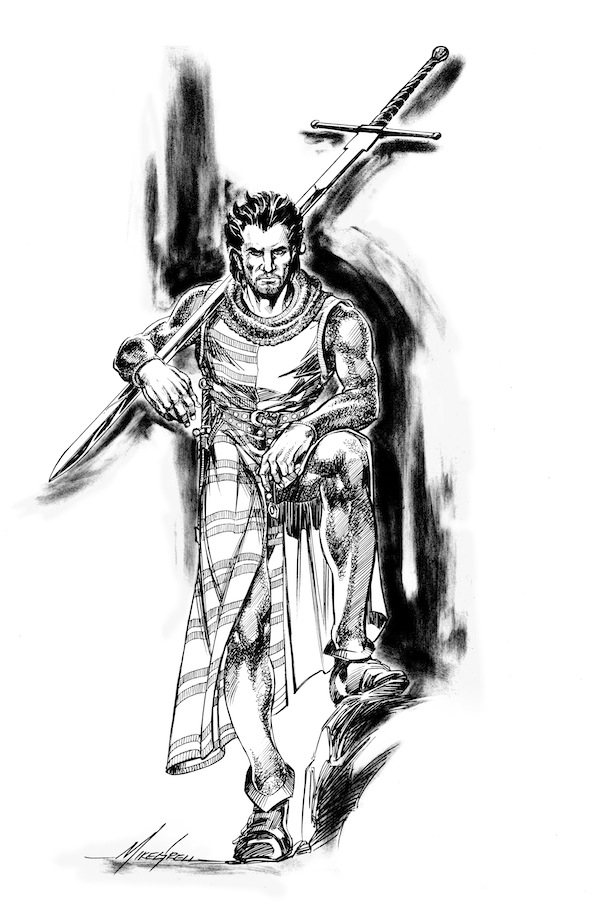
This illustration of the character Eleazar appears in the Hardcover and digital editions of The Mongoliad: Book One Collector’s Edition.
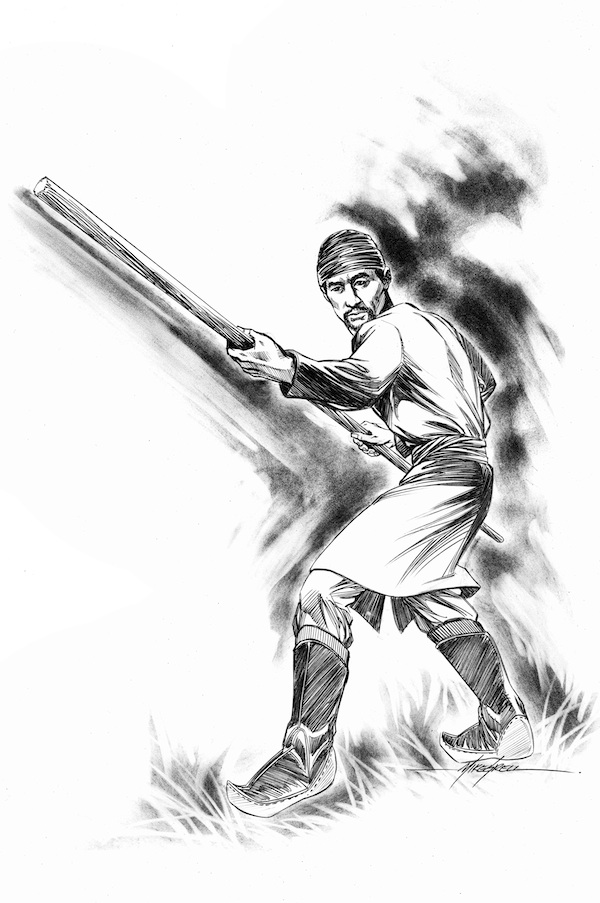
This illustration of the character Kim appears in the Hardcover and digital editions of The Mongoliad: Book Two Collector’s Edition.
The Mongoliad: Book Two © Neal Stephenson, Greg Bear, Mark Teppo, Nicole Galland, Erik Bear, Joseph Brassey, Cooper Moo 2012




